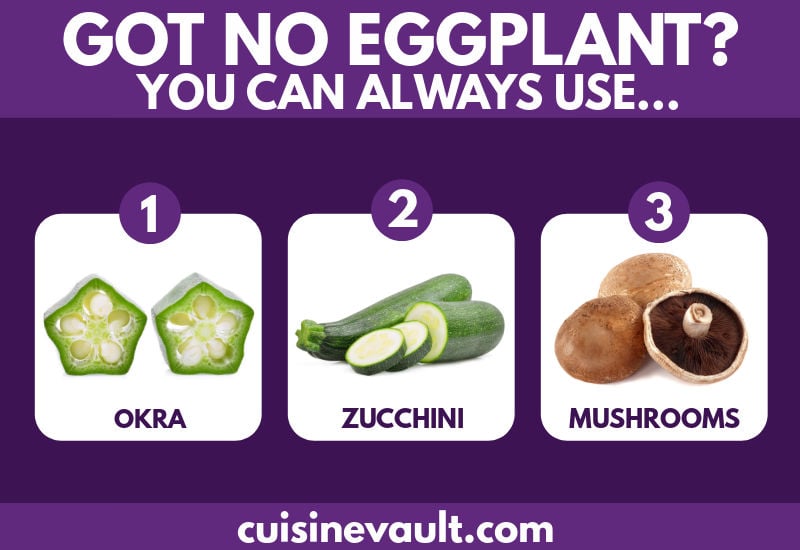Eggplant is bitter and spongy when raw, but its flavor softens once cooked as does the texture. It is a multitasker in the kitchen, suitable for Baba Ganoush, roasting, stir-fries, casseroles, and eggplant parmigiana.
If you can't eat this vegetable for dietary reasons or you don't enjoy the taste, then you're going to need an alternative. We've pulled together a list of our favorite eggplant substitutes so that you can finish any recipe without the original ingredient.
What are the best eggplant substitutes?
To replace eggplant in cooking your best options are okra, zucchini, mushrooms, summer squash, or root vegetables. Although eggplant is fairly unique in flavor and texture, these alternatives won't be out of place in most dishes. In some cases, you may enjoy the new option more.
 1. Okra
1. Okra
Okra has a mild taste that many describe as slightly grassy. When cooked it has a similar flavor to eggplant and is an excellent substitute.
The biggest difference between the two ingredients is that okra releases a substance that is best described as slimy. In slow-cooked meals like casseroles, it is useful as a thickener, but in other recipes, it can taste unpleasant.
Try soaking okra in vinegar for an hour then thoroughly patting dry before cooking. This will help draw out the mucilage before it ends up in your food. For fast, high-heat dishes like a stir-fry, don’t worry about soaking the okra as it won’t have time to release any unwanted liquid.
2. Zucchini
Zucchini, aka courgette, is a summer squash variety that shares a similar mild flavor to eggplant. Cook time will have a big impact on a zucchini’s texture – if it is cooked too long it will turn very soft. This differs from the eggplant, which holds its shape well. Eggplants are much better suited for layering into a gluten-free lasagna or baked in a ratatouille. However, stews, pasta, stir-fries, and soups are all a good match for zucchini.
Large zucchini can be charred over a flame then added to a paper bag and sealed for five minutes. Peel it and enjoy the smoky-tasting vegetable for baba ganoush.
The beauty of zucchini, like eggplant, is that it doesn’t take center stage in a dish; instead, it takes on the flavors of other foods that surround it.
Interesting reading: learn the best technique for freezing zucchini.
3. Portobello Mushrooms
Portobello mushrooms bring a different umami-packed flavor to your cooking. If you’re trying to closely mimic eggplant, then this won’t be your best option. But mushrooms will be suitable for a range of recipes such as pasta and moussaka.
Their juicy texture and savory taste also make them a useful meat alternative if you’re vegetarian or vegan. Ingredients that are traditionally paired with eggplant, like garlic, tomato, and peppers, will also combine well with mushrooms. Can’t find portobellos near you? Try shitakes.
The limitation of portobello mushrooms is their size. For recipes that call for long slices of eggplant used for layering, mushrooms won’t be suitable. Zucchini is a great choice for this purpose.
Related reading: What are some useful mushroom replacements?
4. Summer squash
Pattypan or yellow squash are a couple of good substitutes for eggplant if you want to bulk up a recipe. Casserole, stir fry, or ratatouille are recipes suitable for this vegetable. They are another mild option that won't overpower your dish with flavor; instead, they provide texture to food.
Larger types of squash are also excellent for stuffing like you would an eggplant. Those who don’t enjoy bitter food will appreciate this replacement.
5. Root vegetables
To replace eggplants in soup, sauce, and curry or to make a spicy moutabal dip, most root vegetables will work perfectly well. Rutabagas, celeriac, or turnips are all easy to find vegetables at the supermarket. It is important to use this option in food that gets cooked for a longer time to ensure that the texture softens sufficiently.
6. Other eggplant varieties
The best replacement for the common purple eggplant is an alternative variety. If you live near a well-stocked fruit and vegetable store, then you might get lucky. Graffiti, Japanese, Chinese, Little Green, Indian, and Thai are all varieties you could try.
Different cultivars can be used interchangeably in your cooking. They have subtle differences in flavor and texture which may appeal to you more than the common variety.

Different eggplant varieties can be used interchangeably in recipes.
How can I reduce the bitterness in eggplant?
If you're looking for an alternative to eggplant because you find the vegetable too bitter, then try one of these tricks:
- For baked slices, cover each piece with salt and lay individual pieces on a paper towel. This will help draw out moisture and reduce the bitterness.
- If you are growing eggplants at home, choose the freshest, youngest ones on offer as these are less pungent.
- For roasted eggplant, salt them after cooking then place them in a colander to drain. You may also want to slice them in the middle to help release the juices.
You might also like to read:
What are some useful substitutes for olives?
4 fast facts about eggplants
- The eggplant is also known as brinjal, melanzana, or aubergine and is a part of the Solanaceae (nightshade) family. Its scientific name is Solanum melongena.
- It got its time from the English as one of the varieties looked similar to an egg.
- Although eggplants are classified as a berry by botanists, they are treated as a vegetable in the kitchen.
- The Globe or American eggplant is the largest and most common variety found in supermarkets throughout the United States. They can grow to over 10 inches in length.

A bowl of baba ganoush made from eggplant.
Summing up
Many popular recipes call for the use of eggplant which can be a challenge if you're allergic to them or don't enjoy their taste. If you need to replace them in a dish, your best options are okra, zucchini, Portobello mushrooms, summer squash, or a root vegetable. Alternative varieties of eggplant can also be used interchangeably with the more common globe variety.
What recipe are you looking to make that calls for eggplant? Please let us know in the comments below.

Leave a Reply